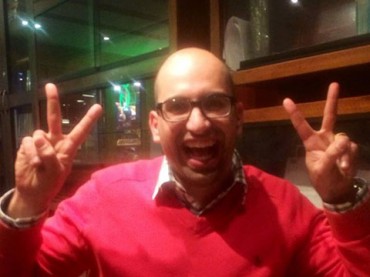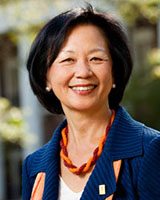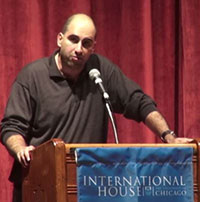
Professor Steven Salaita, whose virulent tweets this summer seemed to celebrate the murder of Jews in the Gaza conflict, may get another chance to join the University of Illinois at Urbana-Champaign faculty – and a payoff from the school regardless.
The school’s Committee on Academic Freedom and Tenure gave Salaita an early Christmas present, recommending that the College of Liberal Arts & Sciences convene a “body of qualified academic experts” to reconsider his candidacy.
“We do not believe that Dr. Salaita’s political speech renders him unfit for office,” the committee report said.
“Further, we find that civility does not constitute a legitimate criterion for rejecting his appointment, and we recommend that statements made by the Chancellor, President, and Trustees asserting civility as a standard of conduct be withdrawn.”
The committee didn’t give an unqualified thumbs-up to Salaita, though, saying Chancellor Phyllis Wise had “legitimate questions” about the academic’s “professional fitness,” given the attitudes expressed in his tweets.
Salaita’s revoked job offer had set off alarm bells for academic freedom groups, including the Foundation for Individual Rights in Education and the American Association of University Professors, which paid particular attention to Wise’s “civility” language.
A chancellor determined to make learning ‘safe’
 The committee gave Wise a reprieve from one of the most damning accusations – that she pulled the job offer in response to pressure from donors. “This investigation found no evidence” that donors influenced Wise in the Salaita matter.
The committee gave Wise a reprieve from one of the most damning accusations – that she pulled the job offer in response to pressure from donors. “This investigation found no evidence” that donors influenced Wise in the Salaita matter.
But it cast doubt on one of her claims, that the board of trustees wouldn’t have approved Salaita if Wise had initially forwarded his appointment, citing one member who said his colleagues “were never close” to rejecting Salaita.
The report makes much of Wise’s stated “desire to protect students” from a professor whose tweets she found “harassing, intimidating” and even “hate speech.”
“Her intention was not to restrict the discussion of controversial topics; rather, it was to create an atmosphere at the university that was ‘welcoming’ and ‘safe’ for students and where controversial topics could be discussed in a safe and respectful learning environment,” the report said.
Despite not having been approved by the board, Salaita for all intents and purposes had been hired by the school, the report said, noting his courses had already been posted and the school had even recommended a “mover” and arranged for his “moving expenses.”
How to dump a professor the right way
 If Salaita’s job offer was “truly conditional,” the report said, a “prudent administration” should have either told him to “take an unpaid leave of absence” from his Virginia Tech position or resign from Virginia Tech “only upon notice that [board] approval had been granted.”
If Salaita’s job offer was “truly conditional,” the report said, a “prudent administration” should have either told him to “take an unpaid leave of absence” from his Virginia Tech position or resign from Virginia Tech “only upon notice that [board] approval had been granted.”
When Salaita’s tweets went viral, the school could have given him “an opportunity to respond in writing” and then the matter referred to “an appropriate group of academic experts,” who would in turn send their recommendation “through the normal appointment reporting procedures before final action,” the report said.
The committee excoriated Wise for not consulting with “any of the directly-concerned officers or units in the chain of those recommending the appointment.”
President Robert Easter and the trustees also showed “disregard for the principles of shared governance” and the school’s own policies, endangering “the trust necessary for a complex web of interdependent relationships to function well and with integrity,” the report said.
The committee had more difficulty deciding whether Salaita’s tweets should be judged under “political” or “professional” standards, though: Salaita’s own stated understanding of his work is “almost indistinguishable from a political purpose.”
It’s legitimate for the recommended body of experts to consider whether Salaita’s “passionate political commitments have blinded him to critical distinctions, caused lapses in analytical rigor, or led to distortions of facts,” the report said.
The committee added that the situation was so “extraordinary” that the trustees, using the committee’s “professional” logic, were unlikely to target any future candidate whose remarks they deem “unpopular or offensive.”
Setting a bad precedent with ‘no objective standard of measure’
In an expansive appendix section, the committee tore apart Wise and the trustees’ “civility” justification for not approving Salaita’s appointment.
Civility “and all its cognates — responsible, respectful, temperate — or its antonyms — disrespectful, demeaning, intemperate — provide no objective standard of measure,” the committee said. “Speakers are at their peril depending on where their listeners would draw the line. The natural consequence of such ambiguity is for the speaker to steer clear of the zone of uncertainty.”
While Wise and the trustees may think their statements justifying Salaita’s revoked offer are just “avuncular urgings for the observance of good manners,” they are actually “de facto justifications of the decision to halt an employment process and suggest a standard to be observed in the future,” the committee said.
Whatever the school decides about Salaita, he’s entitled to payment for his trouble, the report said. For its “irregular adherence to its own policies and procedures,” the school should “take responsibility for the financial consequences” to the academic.
Greg Piper is an assistant editor at The College Fix. (@GregPiper)
Like The College Fix on Facebook / Follow us on Twitter
IMAGES: Facebook, University of Illinois, Twitter screenshot
Like The College Fix on Facebook / Follow us on Twitter






Please join the conversation about our stories on Facebook, Twitter, Instagram, Reddit, MeWe, Rumble, Gab, Minds and Gettr.